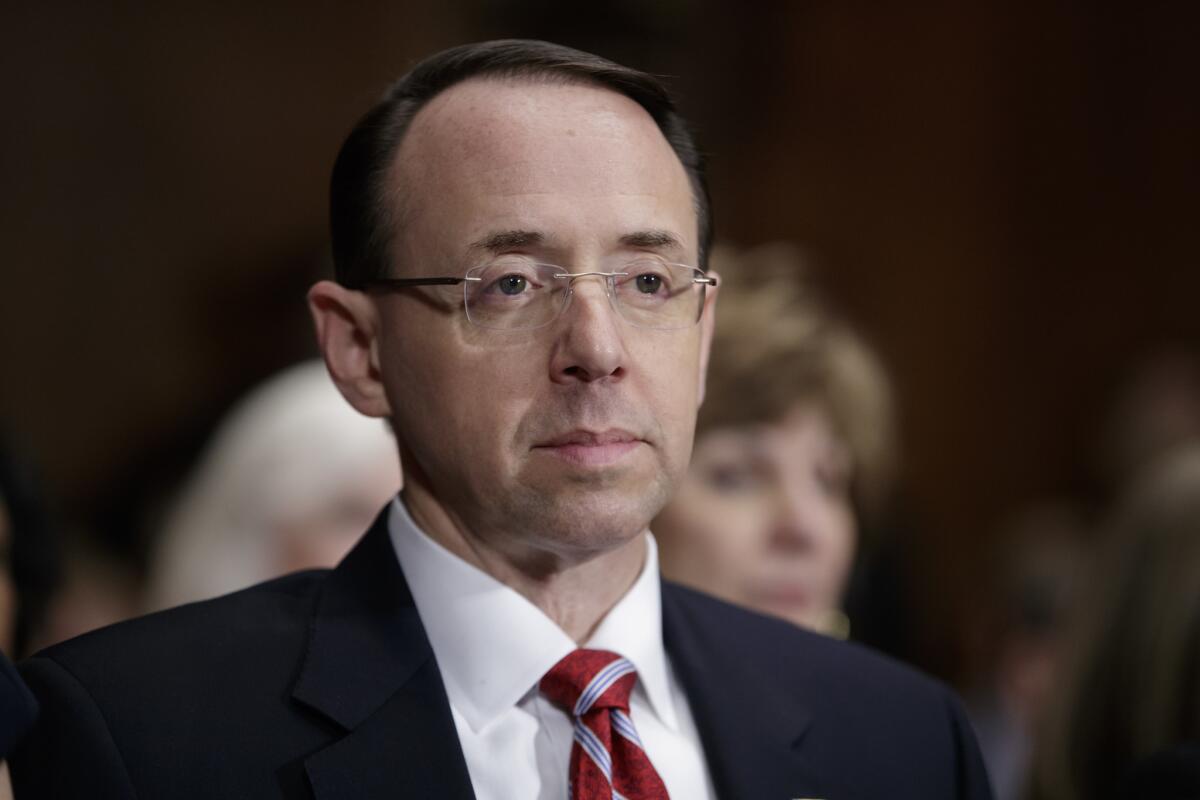A veteran prosecutor takes over No. 2 job at Justice Department â and the Russia investigation

Reporting from Washington â The Senate voted overwhelmingly Tuesday to confirm Rod J. Rosenstein as the No. 2 official at the Justice Department, a post that puts the veteran prosecutor in charge of the investigation into whether current or former aides to President Trump coordinated with Russia during the 2016 campaign.
Rosenstein, 52, won unusual bipartisan support on the strength of his crime-fighting efforts as the U.S. attorney for Maryland for the last 12 years. He was confirmed as deputy attorney general by a vote of 94-6.
Normally the deputy has a low public profile, but Rosenstein will not have that luxury: Atty. Gen. Jeff Sessions recused himself from the Russia investigation after news reports revealed he had failed to tell his Senate confirmation hearing about his meetings last year with Russiaâs ambassador to the U.S.
It will fall to Rosenstein to decide whether to file criminal charges against any of Trumpâs aides, to drop the case entirely or to hand it off to an independent prosecutor.
At his Senate confirmation hearing March 7, Rosenstein refused to say whether he would be willing to bring in a special counsel, saying he wouldnât make judgments in advance.
But he said he had âno reason to doubtâ the conclusions of U.S. intelligence agencies that Russian authorities sought to influence the presidential race. He also said he believed the Justice Department could handle the most politically complicated cases without fear of compromise.
During the hearing, Rosenstein referred to his work in the 1990s in the independent counsel investigation of President Bill Clinton and Hillary Clinton for their investments in a failed real estate company known as Whitewater.
Rosenstein was involved in separate questioning of both Clintons, who never were charged with a crime. More than a dozen others were charged and convicted, including the governor of Arkansas.
Rosenstein has spent 27 years at Justice, getting an early job as a senior aide to a deputy attorney general. As U.S. attorney, he supervised a broad range of criminal prosecution.
He first was nominated to the post by President George W. Bush. President Obama kept him on after the Senate did not move on Bushâs nomination of Rosenstein for a seat on a federal appeals court.
As Sessionsâ top deputy, Rosenstein will be responsible for using Justice Department resources to step up enforcement of immigration laws, a Trump administration priority.
Sessions already has instructed all U.S. attorneyâs offices to be more aggressive about filing criminal charges against people who cross the border illegally, and he has threatened to cut off department grants to so-called sanctuary cities unless they cooperate with immigration agents.
Jamie Gorelick, who served as deputy attorney general from 1994 to 1997 under the Clinton administration, praised Rosenstein at an ethics conference Monday. She said the department would remain in experienced hands.
Sessions âpicked someone who grew up in the department and knows how cases are decided, and should be decided,â she said.
Twitter: @jtanfani
More to Read
Get the L.A. Times Politics newsletter
Deeply reported insights into legislation, politics and policy from Sacramento, Washington and beyond. In your inbox three times per week.
You may occasionally receive promotional content from the Los Angeles Times.











